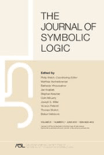
JOURNAL OF SYMBOLIC LOGIC
metrics 2024
Exploring the Frontiers of Logic and Philosophy
Introduction
The JOURNAL OF SYMBOLIC LOGIC, published by Cambridge University Press, stands as a leading platform for scholarly discourse in the realms of logic and philosophy. With a rich history dating back to 1938, this esteemed journal is dedicated to presenting cutting-edge research that pushes the boundaries of knowledge within symbolic logic and its applications. In 2023, it proudly holds a distinguished Q1 ranking in both Logic and Philosophy categories, reflecting its high impact and relevance in the academic community. Researchers and academics benefit from its rigorous peer-review process and contributions from leading scholars worldwide, ensuring the dissemination of high-quality research and critical theories. While the journal currently does not operate under an open access model, it remains a pivotal resource for professionals seeking to deepen their understanding of logical theories and philosophical inquiries. Explore the JOURNAL OF SYMBOLIC LOGIC to engage with scholarly articles that challenge conventional thought and inspire future research.
Metrics 2024
 0.70
0.70 0.50
0.50 0.60
0.60 47
47Metrics History
Rank 2024
Scopus
IF (Web Of Science)
JCI (Web Of Science)
Quartile History
Similar Journals

Computability-The Journal of the Association CiE
Pioneering Insights in Artificial Intelligence and BeyondComputability - The Journal of the Association CiE, published by IOS PRESS, is a premier academic journal dedicated to advancing the field of computational theory and its applications. Established in 2012, this journal serves a diverse audience, including researchers, professionals, and students involved in the realms of Artificial Intelligence, Computational Theory and Mathematics, and Theoretical Computer Science. With robust categorization in Q2 and Q3 quartiles for various related fields, it provides a vital platform for innovative research and discussions that shape the landscape of computational technologies. Although it operates under a subscription model, the quality of published content ensures significant academic contributions and offers valuable insights relevant to contemporary scientific challenges. Researchers interested in the intersection of computation and its practical implications will find Computability an essential resource for exploring cutting-edge developments and fostering scholarly exchange.
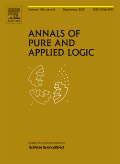
ANNALS OF PURE AND APPLIED LOGIC
Cultivating a Deeper Understanding of Logic's ImpactANNALS OF PURE AND APPLIED LOGIC is a premier academic journal published by Elsevier, specializing in the foundational aspects of logic since its inception in 1974. With a strong commitment to disseminating original research, the journal focuses on both pure and applied logic, making significant contributions to the fields of mathematics and computer science. The journal is recognized for its rigorous peer-review process and is currently ranked Q1 in Logic, reflecting its status among the top-tier publications in the discipline. Researchers will find valuable insights and advancements in logical theory and practice in its pages, while the journal's Scopus ranking further positions it strategically within the mathematical logic community. Although it is not an open-access publication, it offers convenient access options for institutions and subscribers, ensuring a wide reach for groundbreaking findings. The ANNALS OF PURE AND APPLIED LOGIC continues to be an essential resource for professionals, students, and academics alike, facilitating a deeper understanding of logical frameworks and their applications.
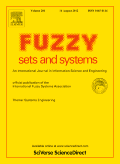
FUZZY SETS AND SYSTEMS
Transforming Data Analysis with Fuzzy Logic InsightsFuzzy Sets and Systems, published by Elsevier, is a leading international journal that delves into the intricate field of fuzzy logic and its applications in various domains, including artificial intelligence and computational mathematics. With a significant impact within its categories—ranking Q2 in Artificial Intelligence and Q1 in Logic for 2023—this journal offers a robust platform for scholars to share cutting-edge research and developments. Focusing on the application of fuzzy set theory to enhance decision-making processes, modeling, and data analysis, it caters to a diverse audience of researchers, industry professionals, and advanced students. The journal's rigorous review process and prestigious ranking, evidenced by its impressive Scopus metrics—2nd in Mathematics & Logic and 120th in Computer Science—underscore its importance in the academic landscape. Contributors are encouraged to explore innovative methodologies, theoretical advancements, and interdisciplinary approaches. Fuzzy Sets and Systems continues to serve as a vital resource for advancing knowledge and fostering collaboration within the fuzzy logic community.
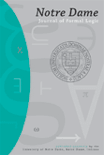
Notre Dame Journal of Formal Logic
Cultivating Insightful Perspectives on Logic and ReasoningNotre Dame Journal of Formal Logic is a premier academic publication dedicated to the advancement of research in the field of logical studies. Published by DUKE UNIVERSITY PRESS, this journal has been a significant contributor to the discipline since its inception in 1960, with an impressive convergence of scholarly articles expected to continue through 2024. With its focus on rigorous formal logic, the journal plays a crucial role in fostering discussions that bridge mathematics and philosophical inquiry, holding a notable Q2 ranking in the 2023 Logic category. Despite its non-open-access status, the journal reaches a wide audience of researchers, professionals, and students committed to exploring the foundational aspects of logics. Located in Durham, NC, it provides a platform for innovative thought and critical engagement within the logic community. With its impactful contributions, the Notre Dame Journal of Formal Logic stands as a vital resource for those seeking to deepen their understanding of both classic and contemporary logical theories.

FUNDAMENTA MATHEMATICAE
Advancing the frontiers of algebra and number theory.FUNDAMENTA MATHEMATICAE is a distinguished journal in the realm of mathematics, focusing on algebra and number theory, published by the Polish Academy of Sciences, Institute of Mathematics - IMPAN. With a rich publication history dating back to the late 20th century, it serves as a vital platform for innovative research, fostering intellectual discourse among mathematicians globally. As a Q3 journal in the 2023 category for Algebra and Number Theory, it holds an essential place within the academic community, particularly noted for its contribution to advancing theoretical knowledge and practical applications in mathematics. Although it does not currently offer an open access model, the journal's commitment to quality and rigor ensures that the research disseminated is of high impact and relevance. It actively supports the scholarly pursuits of researchers, professionals, and students alike, making it an invaluable resource for those dedicated to the mathematical sciences.

Studia Logica
Fostering Rigorous Exploration in Logic and PhilosophyStudia Logica is a leading international journal published by Springer that focuses on the intricate interconnections between logic, philosophy, and the history of science. Established in 1953, this journal has garnered an esteemed reputation, consistently appearing in the Q1 category for History and Philosophy of Science and Q2 for Logic in 2023. With a robust Scopus ranking, where it stands at #42 out of 223 in the field of Arts and Humanities and #17 out of 41 in Mathematics (Logic), Studia Logica is pivotal for researchers and scholars keen on exploring the foundations and implications of logical theory and its applications. The journal does not follow an open access model, ensuring that the published work maintains a high standard of quality and rigor. Located in Dordrecht, Netherlands, the journal continues to be a crucial conduit for advancing scholarly discourse and disseminating cutting-edge research in its respective fields.

Reports on Mathematical Logic
Innovating Ideas at the Intersection of Logic and PhilosophyReports on Mathematical Logic is an esteemed academic journal published by Jagiellonian University’s Theoretical Computer Science Department in Poland. Focusing on the interdisciplinary realms of logic and philosophy, this journal publishes rigorous research articles that explore the foundational aspects and implications of mathematical logic in various contexts. Although it currently maintains an open access model, the journal's impact can be seen through its categorized rankings, with a Q4 in Logic and a commendable Q2 in Philosophy as of 2023. This positions it as a valuable resource for academics seeking to engage with innovative ideas and methodologies in the field. Additionally, the journal has a historical academic presence, having converged in its publication years from 2011 to 2014 and again from 2016 to 2023, underscoring its ongoing commitment to advancing knowledge in logic. With a focus on contemporary research, Reports on Mathematical Logic is essential for researchers, professionals, and students aiming to stay at the forefront of logic studies.

JOURNAL OF AUTOMATED REASONING
Exploring the Intersection of AI and LogicJOURNAL OF AUTOMATED REASONING is a premier academic journal published by SPRINGER, focusing on the dynamic and evolving fields of Artificial Intelligence, Computational Theory and Mathematics, and Software. With an ISSN of 0168-7433 and E-ISSN 1573-0670, this journal ranks impressively in the second quartile (Q2) across multiple categories, reflecting its significant contribution to the advancement of knowledge in automated reasoning methodologies. Since its inception in 1985, it has served as a vital platform for researchers and professionals to share groundbreaking findings and innovative techniques, facilitating the exploration of algorithms, logical frameworks, and reasoning processes that underpin artificial intelligence systems. Although it does not currently offer Open Access options, it remains a highly regarded resource, cited widely in academia, with its impactful publications reflecting deep insights and rigorous scholarly standards. The journal’s esteemed status and its ongoing commitment to fostering a greater understanding of automated reasoning make it an invaluable asset for those dedicated to pushing the boundaries of these interdisciplinary fields.

Bulletin Mathematique de la Societe des Sciences Mathematiques de Roumanie
Fostering Innovation in Mathematical ResearchThe Bulletin Mathematique de la Societe des Sciences Mathematiques de Roumanie, published by SOC MATEMATICE ROMANIA, is a distinguished platform dedicated to the dissemination of advanced mathematical research and developments. With ISSN 1220-3874 and E-ISSN 2065-0264, this journal serves the global mathematical community, particularly in Romania, fostering collaboration and innovation in varied mathematical disciplines. Despite being categorized in the Q3 quartile of the *Mathematics (miscellaneous)* field and holding a Scopus rank placing it in the 19th percentile, the journal remains committed to publishing high-quality articles that explore theoretical and applied mathematics. Running from 2008 to 2024, it aims to encourage the sharing of knowledge and advancements within both academic and practical domains, affirming its importance as a valuable resource for researchers, professionals, and students alike. Although the journal does not currently offer open access, it contributes to the mathematical discourse through the rigorous selection of papers that adhere to high scholarly standards.
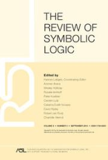
Review of Symbolic Logic
Fostering Innovation in Logic and PhilosophyReview of Symbolic Logic is a prestigious academic journal published by Cambridge University Press, dedicated to advancing the field of logic through critical analysis and innovative research. Established in 2008, the journal has become a key fixture in the academic community, particularly recognized for its contributions in the realms of logic, mathematics (miscellaneous), and philosophy. With an impressive classification of Q1 across multiple categories in 2023, it ranks within the top echelons of its field, standing at 15th out of 41 in Logic and 29th out of 90 in miscellaneous mathematics, positioning itself as essential reading for scholars and practitioners alike. Although not Open Access, the journal offers robust access options through institutional subscriptions, providing an expansive platform for the dissemination of high-quality research. Review of Symbolic Logic aims to foster a deeper understanding of symbolic logic's applications and implications while inspiring emerging scholars and seasoned researchers to further the dialogue within this vibrant area of study.